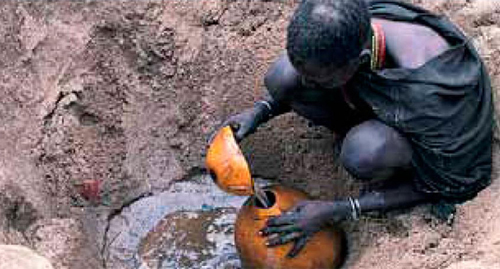
A landlocked country located in Eastern Africa, Uganda has substantial natural resources, including fertile soils, regular rainfall, and sizeable mineral deposits of copper, cobalt, gold and other minerals. Over 80 per cent of the population is rural and depends on rain-fed agriculture, which is vulnerable to the adverse impacts of climate change. The climate of Uganda is not only a natural resource, but a key determinant of the status of other natural resources, such as water resources, forest, agriculture, ecotourism and wildlife. Climate change, which has started manifesting itself through increased frequency of extreme weather events, such as droughts, floods and landslides, is posing a serious threat to Uganda's natural resources and to its social and economic development.

Timelines of the NAPA preparation process in Uganda
| Funding for the preparation of the NAPA approved by the GEF |
July 2003 |
| GEF agency approval date |
December 2003 |
| NAPA preparation start |
Not available |
| Submission of the NAPA to the UNFCCC |
December 2007 |
NAPA projects under implementation
Uganda identified nine priority activities in its NAPA from the following sectors: forestry, agriculture, water resources, health, and weather and climate information.
Uganda intends to implement these priority activities through the adoption of a programmatic approach.
| Project title: Resilient communities through healthy ecosystems programme: a comprehensive approach to NAPA implementation - Phase 1 |
| Implementing agency |
UNEP |
| National executive agency (ies) |
Ministry of Water and Environment with sectoral partners and NGOs |
| Cost in USD million (LDCF component/total cost) |
6.000/13.100 (co-financing = 7.100) |
| First submission of the concept note (PIF) under the LDCF |
July 2010 |
| GEF CEO endorsement of the project |
- |
| Update on progress |
PIF still pending approval by the GEF |
NAPA PROCESS
Preparation and implementation strategy: The NAPA preparation process was guided by two considerations: the need for Uganda to achieve the United Nations Millennium Development Goals as well as the country's development objectives as enshrined in the Poverty Eradication Action Plan (2004). Of particular concern were commitments addressing the eradication of extreme poverty and hunger, ensuring environmental sustainability and gender equity and combating major diseases. The NAPA team drew extensively on information provided by vulnerable communities, in particular their knowledge of coping mechanisms. The full participation of women in the process was ensured through focused questionnaires, interviews and discussions with women groups.
Uganda is grouping all nine NAPA priorities under an umbrella programme. The proposed NAPA programme is focusing on rural community activities. The PIF is still under consideration by the GEF.
The PIF template being used is the one for single projects, although the proposed work is being presented as a programme. It is unclear how the template for the GEF programme framework document could be used to access resources from the LDCF.
Institutional arrangements in the country: In 2008, the country established a national Climate Change Unit under the Ministry of Water and Environment with the financial support of the Government of Denmark. The Climate Change Unit is currently developing a climate investment plan, within which an adaptation programme takes priority. A Cabinet decision is being put in place to transform the Unit into a public institution, in which case the staff will be employed and paid by the Government of Uganda.
Experience with project implementation: Uganda is awaiting GEF approval of the PIF of its NAPA programme to make further progress in the project implementation phase. The Government intends to collaborate with established civil society organizations working at the community level in selected areas to ensure that the limited resources available are used for the direct benefit of communities and that overlaps are kept to a minimum.
Revision and update: Uganda is not considering the revision and update of its NAPA in the near future but could envision its NAPA evolving to include medium- and long-term adaptation needs.
| Uganda's experience shows how the establishment of a climate change institutional framework provides a national drive for developing a cross-sectoral NAPA programme. Such a framework also facilitates interactions on climate change issues between the government and other stakeholders, including local authorities, civil society and vulnerable communities. |